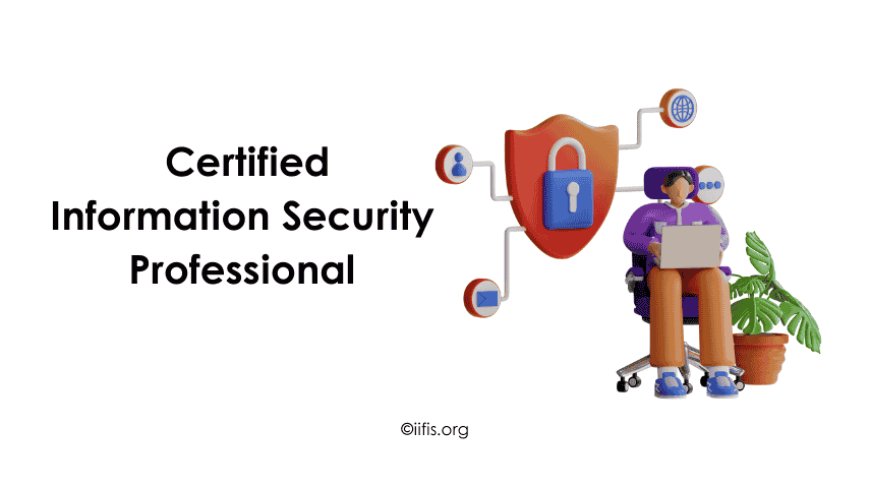How to Become a Certified Information Security Professional
Learn how to become a Certified Information Security Professional with step-by-step guidance on choosing the right certification, meeting eligibility requirements, and advancing your career in information security.

Cyber threats are increasingly advanced, becoming a Certified Information Security Professional (CISP) is crucial for anyone serious about pursuing a career in information security. This certification not only validates your expertise but also significantly improves your career prospects in a field that’s both dynamic and in high demand. In this blog, we’ll guide you through the essential steps to becoming a CISP, from understanding the certification requirements to preparing for the exams and using the credential to advance your career. Whether you’re a seasoned IT professional or just starting out, this comprehensive guide will help you navigate the path to becoming a recognized expert in information security.
What is Information security?
Information security, often referred to as InfoSec, is the practice of protecting information from unauthorized access, disclosure, disruption, modification, or destruction. Its primary goal is to ensure the confidentiality, integrity, and availability of data. This involves implementing various security measures and protocols to protect data from cyber threats, such as hacking, phishing, and malware attacks.
Information security includes a range of practices, including:
-
Risk Management: Identifying, assessing, and mitigating risks to data and systems.
-
Access Control: Ensuring only authorized individuals can access sensitive information.
-
Encryption: Converting data into a secure format to prevent unauthorized access.
-
Incident Response: Developing and implementing strategies to respond to security breaches or attacks.
-
Security Policies: Establishing rules and guidelines to manage and protect information assets.
By focusing on these areas, organizations can protect their data from various threats and ensure their information systems remain secure and reliable.
Understanding the Role of a Certified Information Security Professional
Key Responsibilities and Skills: A Certified Information Security Professional (CISP) is responsible for developing and implementing security policies, conducting risk assessments, and managing security incidents. Essential skills include knowledge of network security, cryptography, and regulatory compliance. CISPs also need to stay updated on emerging threats and security technologies to protect their organization's information systems effectively.
Importance of CISP Certification: In the current job market, CISP certification is highly valued as it demonstrates a professional's expertise and commitment to information security. It is recognized globally and can significantly enhance career prospects by validating a candidate's skills and knowledge in managing and securing information systems.
Career Opportunities and Advancement: With a CISP certification, professionals can access a wide range of career opportunities, including roles such as Security Analyst, Information Security Manager, and Chief Information Security Officer (CISO). This certification also opens doors to higher-level positions and specialized roles, offering substantial career advancement prospects and increased earning potential.
Choosing the Right Certification Program
Overview of Popular CISP Certification Programs:
-
CISSP (Certified Information Systems Security Professional): Offered by (ISC)², CISSP is one of the most recognized certifications in the field. It covers a broad range of topics, including security and risk management, asset security, and security operations. It is ideal for professionals aiming for advanced roles in information security.
-
CISM (Certified Information Security Manager): Provided by ISACA, CISM focuses on information risk management, governance, and incident response. It is suited for those interested in management and strategic roles within information security.
-
CEH (Certified Ethical Hacker): Issued by EC-Council, CEH highlights hands-on skills in identifying and addressing weaknesses through ethical hacking. It is ideal for those looking to specialize in penetration testing and ethical hacking.
Criteria for Selecting the Right Program:
-
Career Goals: Choose a certification that aligns with your desired career path. For managerial roles, CISM might be more appropriate, while for technical roles, CEH or CISSP could be more suitable.
-
Experience Level: Consider your current experience and expertise. CISSP is often recommended for experienced professionals, while CEH can be beneficial for those looking to gain practical, hands-on skills.
-
Industry Demand: Research the demand for certifications in your specific industry or job market to ensure the chosen certification adds the most value to your career.
Comparisons and Unique Benefits:
-
CISSP: Offers comprehensive coverage of security domains, making it versatile for various roles in information security.
-
CISM: Focuses on management and governance features, beneficial for those looking to lead security teams and develop security policies.
-
CEH: Provides practical skills in ethical hacking, ideal for those who want to specialize in identifying and addressing security weaknesses.
Average Salaries for Information Security Certifications in India
-
Average Salary: ₹15-20 lakhs per annum
-
Description: CISSP is a globally recognized certification for experienced security practitioners, managers, and executives. It generally commands a high salary due to its comprehensive coverage of information security domains.
-
CISM (Certified Information Security Manager)
-
Average Salary: ₹12-18 lakhs per annum
-
Description: CISM focuses on management and governance of information security and is valued for roles that involve developing and managing an enterprise information security program.
-
CEH (Certified Ethical Hacker)
-
Average Salary: ₹8-12 lakhs per annum
-
Description: CEH is geared towards professionals who specialize in ethical hacking and penetration testing. It generally results in competitive salaries, especially in roles related to network security and vulnerability assessment.
Meeting the Eligibility Requirements
Educational and Professional Experience Prerequisites to qualify for CISP certifications, specific educational and professional experience requirements must be met.For example:
-
CISSP: Requires a high school diploma or equivalent, and a minimum of five years of work experience in at least two of the eight CISSP domains. A relevant bachelor’s degree or an approved certification can reduce this requirement by one year.
-
CISM: Typically requires a bachelor’s degree and a minimum of five years of work experience in information security management, with at least three years in at least three of the four CISM domains. Relevant certifications or an advanced degree may also count towards experience.
-
CEH: Requires two years of work experience in the information security field. Alternatively, completing an official EC-Council training course can substitute for the work experience.
Required Number of Years of Work Experience: Each certification has specific experience requirements:
-
CISSP: Five years of relevant work experience.
-
CISM: Five years of experience in information security management.
-
CEH: Two years of work experience or completion of a training course..
Preparing for the Certification Exam
Study Materials and Resources:
-
Books: Use guides like “(ISC)² CISSP Official Study Guide” or “CISM Review Manual.”
-
Practice Exams: Familiarize yourself with the exam format and question types through practice tests.
Study Plan and Schedule:
-
Assess Knowledge: Identify strengths and weaknesses.
-
Set Goals: Break material into sections and set goals.
-
Create a Schedule: Plan regular sessions, focusing on tough topics.
Joining Study Groups or Forums:
-
Study Groups: Collaborate with peers for motivation.
-
Online Forums: Engage in communities for support and resources.
Registering and Taking the Certification Exam
Steps for Registering:
-
Choose a Certification: Select the certification program of IIFIS which aligns with your career goals.
-
Create an Account: Register on the certification body’s website
-
Submit an Application: Complete the application form, provide necessary documentation, and pay the exam fee.
-
Schedule the Exam: Choose a convenient date and location, or opt for an online proctored exam if available.
Maintaining Your Certification
Requirements for Continuing Education:
-
Continuing Education: Most certifications require ongoing education to stay current. This can include attending training sessions, webinars, or industry conferences.
-
Professional Development: Engage in activities such as publishing articles, teaching courses, or participating in relevant projects to earn Continuing Professional Education (CPE) credits.
Importance of Staying Updated:
-
Industry Trends: Information security is a rapidly evolving field. Staying informed about the latest threats, technologies, and best practices is crucial for maintaining expertise.
-
Adaptation: Regularly updating your knowledge ensures you can effectively address new security challenges and remain competitive in the field.
Renewal Process and Recertification:
-
Renewal Requirements: Follow the specific renewal guidelines provided by the certifying body, which may include completing a certain number of CPE credits and paying a renewal fee.
-
Recertification Options: Some certifications may offer options for recertification through exams or additional coursework to keep your credentials up to date.
Using Your Certification for Career Advancement

-
Highlighting Certification:
-
Resume: List your certification prominently in the “Certifications” section. Include the certification name, issuing organization, and date obtained. Add any relevant skills or achievements.
-
LinkedIn Profile: Add your certification under the “Licenses & Certifications” section. Mention any key projects or roles where the certification was applied.
-
Networking Opportunities:
-
Professional Organizations: Join groups like (ISC)² or ISACA to connect with industry professionals and stay updated on trends.
-
Events and Conferences: Attend industry events to meet potential employers and expand your professional network.
-
Utilizing Certification for Career Growth:
-
Promotions: Leverage your certification to demonstrate expertise and readiness for advanced roles within your current organization.
-
Job Changes: Use the certification to stand out in job applications and interviews, showcasing your specialized knowledge.
-
Salary Prospects: Highlight the certification in negotiations to justify a higher salary based on your advanced qualifications.
Additional Resources and Continuing Education
-
Recommended books, online courses, and workshops for further learning.
-
Professional associations and communities for ongoing support and development.
-
Emerging trends and advanced certifications in information security.
Becoming a Certified Information Security Professional involves several key steps: selecting the right certification program, meeting eligibility requirements, preparing thoroughly using study materials and practice exams, and finally, successfully registering and taking the exam. Maintaining your certification through ongoing education and staying updated with industry trends ensures your skills remain relevant and sharp.
Pursuing certification is a valuable investment in your career, enhancing your expertise and opening doors to advanced roles and better job opportunities. Start your certification journey today and stay committed to continuous learning and professional growth. For additional resources and support, consider exploring opportunities with IIFIS (International Institute for Information Security), which can help you advance your career in information security.
























